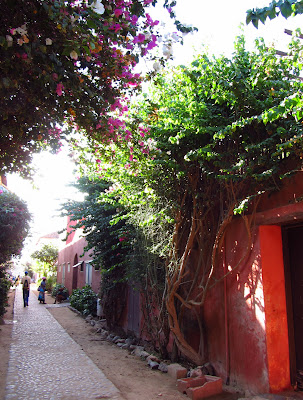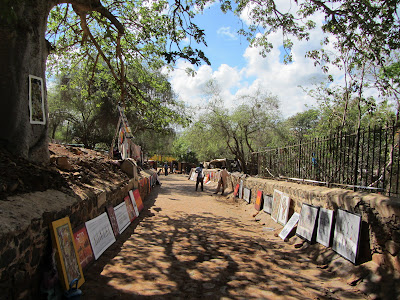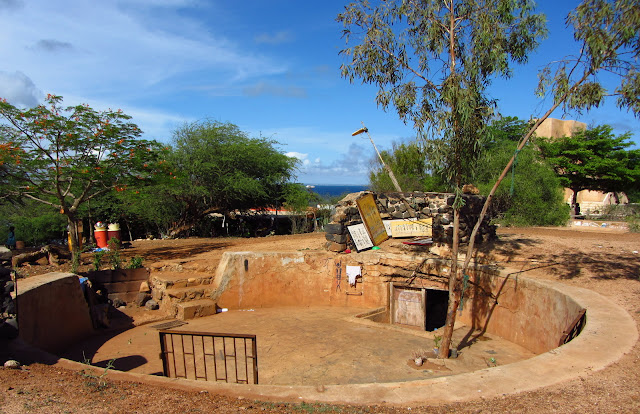I have quickly realised that my blog entries about touristy things are going to be extremely different to what I'm used to writing. Primarily because tourism (which for me - is more or less doing or seeing something new in a different place) is totally different to what it is in Europe. Essentially, it is a lot more limited by that definition. There aren't that many places in Senegal that I would say I would want to go to from a tourist point of view (of course, this is solely my opinion). Either that, or my enthusiasm for travelling has waned a bit (possible, but less likely). Within Dakar, I don't have that much enthusiasm to go and 'see' things, but I guess that's because the few cultural sites are all in French, and there isn't really a heck of a lot of 'beauty' around. Nice architecture is lacking, as is places of natural beauty.
Enter two things to do. SCUBA diving, and visiting Gorée Island...
Gorée Island is famous for its history. A slave trading post in West Africa with many stories exaggerating its history. That's not to say it wasn't a slave trading post, but just that its significance as one has been questioned by some scholars. That's also not to diminish the history of slave trading. For this, it is certainly worth a step into the French Colonial past of this island which sticks out as a unique spot which is in the calm waters between downtown Dakar and the rest of Africa.

The trip to and from Gorée is on a boat called
Beer. It's a pleasant 20 minute journey which cost me 5,200 CFA return (only 1,000 CFA for Senegalise residents). Even the guides on the boat who were bugging me constantly to try and get my business, did so in a friendly way, setting the mood for the island (however, the damn annoying sellers with their clanking wooden maracas type instruments almost tipped the scales the other way). Arriving at the island made me feel like I was arriving in a totally different country. Without cars, the place just seems so much more peaceful than the constant chaos of Dakar! The small beach by the jetty was clean (by local standards) and quite full. Thankfully, the ferry as well as the island itself weren't totally packed, due to the fact that Ramadan had just started. I was warned that Gorée is a haven for locals wanting a break from Dakar - and I can undertstand why.

Apart from eating, and wandering around, there really isn't a heck of a lot to do there. But that was perfectly OK with me. Eating is always good, though it is bordering on "bad" when the fly population at the table rivals that of Central Australia. The island is easily walkable, and there is a nice lookout hill with both a memorial, and left-overs of one of the canons that used to protect Dakar from invading armies (now pointed inwards for some weird reason!) The walk up the hill though, takes one past a non-stop stream of artists and artisans selling their wares. The art is pretty good, but a little repetative. There are some beatiful African canvas paintings (as well as a lot of shit), sand art, lots and lots of jewellery, fabrics, and something I found particular fascinating, 3D art partially made using old electronics. These would all be in the same style as the canvas paintings (usuall black figures with a stick-like appearance), but the body might be made of a broken Nokia 5110 for example. 10 points for recycling.

 |
| Recycling bins - with instructions! |
Speaking about recycling. Whilst Dakar (and much of Senegal) can possibly be considered the world's largest rubbish bin, Gorée Island is a lot cleaner (but far from 'clean'). Somehow, the concept of recycling has made here. How much it is done, I really don't know, but I have a feeling the UNESCO World Heritage listing may have had something to do with it. Just a hunch...

 |
| Monument to the slaves in the gardens outside the House of Slaves. |
The architecture on the island is also certainly an improvement on Dakar. There are actually some cool colonial facades around the place. Whilst walking around Dakar you feel like you have lost much of your colour perception, pigmented paint has actually made it to Gorée so the whole place has a nicer feel to it. Of course, this is history aside. There are various monuments around the island, and a few plaques as well. But the only 'cultural' place set foot inside was The House of Slaves. The Door of No Return, located at the back of this house, opens up to the ocean and is said to the be the door that most slaves that were traded from the island walked through to get on their boat to the "New World". The inner courtyard of the building reveals a number of cellars where apparently the slaves were kept, packed in like wild dogs, prior to being sold. Definitely a bit harrowing. And definitely yet another reminder (just in case we really needed one) of something else our white European ancestors did to screw others.
 |
| Dakar in the distance, behind the 'local art' |

One thing I found slightly ironic about Gorée was the number of people around who looked like they were in Jamaica (or rather, how I'd imagine people would look over in Jamaica). It's as if the slaves went to the New World, then came back with some of the things they liked - dreadlocks and the idea of tucking a few kilos of them under a woolen hat so it looks like you have a cat sitting on your head - all while it is over 30'C and damn humid!
 |
| Old gun mounts now house artisans and their goods |
 |
Who needs a church organ when you have
bongo drums? |
I would like to return for one moment to my comment about most of the country being one large rubbish bin here. Unfortunately, this also extends to the ocean. The beaches here are generally filthy. Additionally, when I went diving, I discovered the filth is there too. The amount of plastic and other human waste under water, caught up in various aquatic plants, and sitting on the rocks, is incredible. Whether the pollution is the reason for the not-so-amazing diving, I'm not sure, but it definitely doesn't look good. On the other hand, in a country where a population has much bigger fish to fry, how can one really convince each individual of the need to look after the environment?!?
Of course, other aspects of diving here are different to what I'm used to. Having had mild asthma in the past, and with the global air of the fear of being sued, most dive companies are not that keen on taking asthmatics. Those that will, often require a doctor's OK in order to rid themselves of some liability. On two separate occasions in Thailand, this has involved me filling in the form at the dive shop, ticking the 'asthma box', being sent over to the local doctor who performs a rudimentary check-up for a couple of dollars, writes that I'm perfectly healthy, and away we go. I was all prepared to finally admit that I have learnt my lesson and that sometimes it is is better to lie, I was ready to just not tick the asthmatic box this time. Yet much to my surprise, without so much as seeing a form, I was in my wetsuit and ready to jump in the water for my dive. Never before have I seen such a relaxed dive shop. That's not to say they weren't professional, and the equipment was certainly A-OK. But it was great to simply have someone take my word about my certification, no questions asked and no forms to fill out. Nice!
 |
| Bottle-tops put to good use - a place mat! |
 The trip to and from Gorée is on a boat called Beer. It's a pleasant 20 minute journey which cost me 5,200 CFA return (only 1,000 CFA for Senegalise residents). Even the guides on the boat who were bugging me constantly to try and get my business, did so in a friendly way, setting the mood for the island (however, the damn annoying sellers with their clanking wooden maracas type instruments almost tipped the scales the other way). Arriving at the island made me feel like I was arriving in a totally different country. Without cars, the place just seems so much more peaceful than the constant chaos of Dakar! The small beach by the jetty was clean (by local standards) and quite full. Thankfully, the ferry as well as the island itself weren't totally packed, due to the fact that Ramadan had just started. I was warned that Gorée is a haven for locals wanting a break from Dakar - and I can undertstand why.
The trip to and from Gorée is on a boat called Beer. It's a pleasant 20 minute journey which cost me 5,200 CFA return (only 1,000 CFA for Senegalise residents). Even the guides on the boat who were bugging me constantly to try and get my business, did so in a friendly way, setting the mood for the island (however, the damn annoying sellers with their clanking wooden maracas type instruments almost tipped the scales the other way). Arriving at the island made me feel like I was arriving in a totally different country. Without cars, the place just seems so much more peaceful than the constant chaos of Dakar! The small beach by the jetty was clean (by local standards) and quite full. Thankfully, the ferry as well as the island itself weren't totally packed, due to the fact that Ramadan had just started. I was warned that Gorée is a haven for locals wanting a break from Dakar - and I can undertstand why.













No comments:
Post a Comment